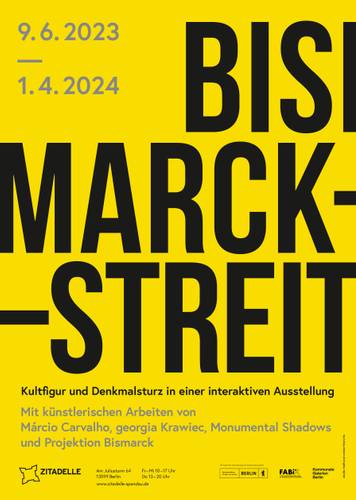With artistic works by Márcio Carvalho, georgia Krawiec, Monumental Shadows and Projection Bismarck.
During his lifetime, his many admirers dedicated more than 30 monuments to Chancellor Otto von Bismarck (1815-1898). After his death, the commemoration of the “Iron Chancellor” in public spaces multiplied into a flood of monuments: by 1906, there were already more than 300 statues, columns, obelisks and towers. Today, more than 700 monuments, including street and place names, have been documented. In everyday culture, the national cult figure was welcomed as a lucrative merchandising strategy to sell any number of Bismarcks, from herring jars to beer mugs.
But from the very beginning, there were critical, derisive and even aggressive reactions to the glorifying memorials. The “storming of monuments” against Bismarck, as it is perceived today, is not new. There were and are many reasons for the problematisation of the Bismarck cult, which quickly distanced itself from the actual person. In particular, the use of the chancellor’s biography for a nationalist exaltation of a united – and warring – Germany is on the one hand linked to the unease and on the other hand the indignant defence of his memory. Today, Bismarck’s role in German colonialism is the main factor leading to disputes about the ubiquitous name. The exhibition project is intended as a contribution to the current debate. Historical information is provided on Bismarck as a person, but above all on the history of his monuments, some of which have been teared down. There is also a link to the museum “Unveiled. Berlin and its Monuments”, which focuses on the lost bust of Bismarck in the Siegesallee.
The playful and yet rather critical works of the artists mentioned above are the many possibilities of dealing with Bismarck monuments outside the museum and beyond destruction. In addition, they are an incentive for visitors to make use of the opportunities provided, to express their own opinions in a creative way. From guerrilla knitting to voting for new namings, visitors are given opportunities to engage in constructive dispute and further development of the exhibition as a place of democratic debate.
Runtime: Fri, 09/06/2023 to Mon, 01/04/2024
Price info: Free entry for people from the Ukraine.
Price: €4.50
Reduced price: €2.50
Reduced price info: children from 6 to 14 years – students – trainees – persons receiving transfer benefits (ALG II, social assistance, benefits under the Asylum Seekers Benefits Act) – persons with severe disabilities from 50% MdE upon presentation of the corresponding ID.
Public Tours in the Citadel Spandau
every 1st Sunday of the month at 2 p.m. in English
regular tours in German on Saturday and Sunday
at 2 p.m.
per person 4,50 € for the Tour
on MuseumsSunday free entry!
05. + 06. Aug.
MuseumSunday cancelled and no guided tours due to concert festival
30.09. / 01. Oct.
MuseumSunday cancelled and no guided tour because of the Jugglers' Festival
Important information about the closing times
of the Spandau Citadel:
Due to Citadel Music Festival concert events, the Citadel will close earlier on some concert dates. Please check our website for more information.
We are not the organizer of the festival and we do not sell tickets for concerts.
